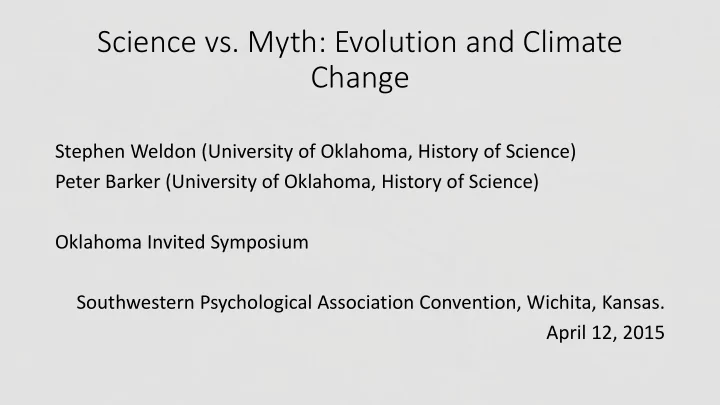

Science vs. Myth: Evolution and Climate Change Stephen Weldon (University of Oklahoma, History of Science) Peter Barker (University of Oklahoma, History of Science) Oklahoma Invited Symposium Southwestern Psychological Association Convention, Wichita, Kansas. April 12, 2015
Evolution and Belief By Stephen Weldon (University of Oklahoma, History of Science Department) “Science and Myth: Evolution and Climate Change” Southwestern Psychological Association Convention, Wichita, Kansas. April 12, 2015
Outline of talk • Antievolution in the 1920s The moral and legal issues • The legal environment after 1968 The separation of church and state • The moral issues driving anti-evolution The dignity of man; freedom of the will • Creation science and intelligent design Criticizing evolution through logical and empirical arguments
The Anti-evolution Crusade of the early 1920s • Spearheaded by William Jennings Bryan • Resulted in the Scopes Trial in which a teacher was charged with teaching evolution in defiance of a Tennessee Law • Was fundamentally about morality, not about scientific evidence William Jennings Bryan Photograph: http://www.agribusinesscouncil.org/bryan.htm
In schools supported by taxation we should have a real neutrality wherever neutrality in religion is desired. If the Bible cannot be defended in these schools it should not be attacked, either directly or under the guise of philosophy or science. The neutrality which we now have is often but a sham; it carefully excludes the Christian religion but permits the use of the schoolrooms for the destruction of faith and for the teaching of materialistic doctrines. (Bryan, The Menace of Darwinism, 1923)
“One hundred years without Darwin are enough.” Hermann Muller (1959) • By the early 1960s, educators and scientists pushed to create a national biology curriculum with evolution at its core • One of the few remaining states with an antievolution statute, Arkansas, was challenged • Epperson v. Arkansas , decided by the Supreme Court in 1968, forbid the states from restricting the teaching of evolution on religious grounds Hermann Muller Photograph: http://en.wikipedia.org/wiki/File:Hermann_Joseph_Muller.jpg
The legal environment in the United States had changed • Several Supreme Court cases before Epperson had laid the groundwork for a more secular interpretation of the First Amendment: • No religious instruction in the public schools • No Bible reading in the public schools • No prayer in the public schools • Epperson was simply the most recent of a string of cases • Evangelicals found this patently unfair Photograph: http://en.wikipedia.org/wiki/United_States_Supreme_Court_Building#/media/File:USSupremeCourtWestFacade.JPG
The moral arguments of the anti-evolutionists • Antievolutionists believed that evolution contradicted the basic values of human dignity and human freedom: • Human beings were either mechanistic and machinelike Francis Schaeffer • Or they were animalistic and driven by passions • They could not accept these evolutionary values. God’s creation of mankind was essential to our culture • Francis Schaeffer, Rousas J. Rushdooney, and other Christian apologists expressed these concerns as large moral issues, Rousas J. Rushdoony not simply issues of the words of scripture Photographs: http://en.wikipedia.org/wiki/Francis_Schaeffer#/media/File:Francis_Schaeffer.jpg, http://en.wikipedia.org/wiki/Rousas_Rushdoony#/media/File:Rousas_Rushdoony.jpg
Evolution’s moral universe was identified with Nazi morality • Max Rafferty’s “Guidelines for Moral Instruction in California Schools” (1969 ) • He linked evolution, sex education, and modern educational psychology techniques to the rise of a powerful authoritarian elite. • He compared sex education to Nazi indoctrination of Hitler Youth, claiming they by sponsored sex orgies for teenage boys. “This conditioning through emotional, animalistic responses has Max Rafferty been developed by the Communoid forces, who apply these techniques to control of group behavior.” Photograph: http://www.joincalifornia.com/candidate/1707
Creation science • The concerted attack on the science of evolution was relatively new. • Scientifically trained evangelicals put forward logical and empirical arguments that attacked evolution • Some examples: • Something cannot come from nothing; inanimate matter cannot be creative. • Natural selection (“survival of the fittest”) is a tautology: we define fit as those who remain alive.
Intelligent Design: Building a science-based case against evolutionary science • In the early 1990s, Phillip Johnson, a lawyer, wrote Darwin on Trial , where he put forth some of the claims that scientists were hiding something as they tried to protect the theory of evolution. • Other scientists with strong religious beliefs began working on ideas that sought to develop mathematical and biological demonstrations that would undermine evolution. Phillip E. Johnson, Willliam • The Discovery Institute, a think tank, got behind Dembski, and Michael Behe Intelligent Design as a scientific argument. Photographs: http://www.law.berkeley.edu/img/Johnson_Philip.jpg, http://en.wikipedia.org/wiki/William_A._Dembski#/media/File:Dembski_head_shot.jpg, http://en.wikipedia.org/wiki/Michael_Behe#/media/File:MichaelBehe.jpg
The antievolution movement today • The moral arguments continue to resonate strongly. • The political environment is ever more polarized. • There is significant distrust of science and the scientific enterprise, at least in certain fields, like biology, fomented by anti-evolutionists. • State legislatures around the country yearly debate bills promoting discussion of scientific controversies in the classroom.
Thank you.
Recommend
More recommend